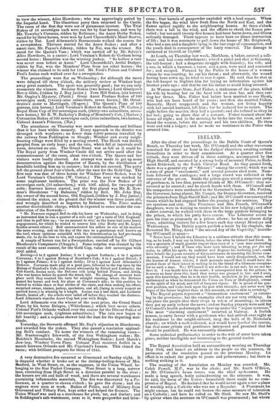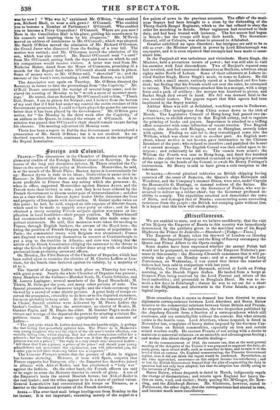IRELAND.
After the close of the proceedings in the Dublin Court of Queen's Bench, on Thursday last week, Mr. O'Connell and the other traversers remained for about an hour in the Judges' chambers, awaiting certain formalities in order to their commitment. At a quarter after five o'clock, they were driven off in three carriages, accompanied by the High Sheriff, and escorted by a strong body of mounted Police, to Rich- mond Bridewell, in the South Circular Road. As they passed forth, there was a general cry of " Silence !" among the crowd ; which was in a state of great " excitement," and several persons shed tears. Num- bers followed the carriages ; and a large crowd was collected at the entrance of the prison. Inside the prison-gate stood a numerous party of gentlemen, in two files, personal friends of Mr. O'Connell : they un- covered as he entered ; and he shook hands with them. O'Connell and. his companions were conducted to the Governor's house. Mr. Pardon, the Governor, being absent, Mr. Cooper, the Deputy-Governor, received the prisoners from High Sheriff Ball ; and Mr. O'Connell was conveyed to rooms which be had engaged before the passing of the sentence. They are spacious and airy. Mrs. Fitzsimon and Mrs. French, O'Connell's daughters, were in waiting to receive him in his new lodging; and after a short interval, he walked with them in the large gardens belonging to the prison, to which his party have access. The Liberator seems to pass his time as pleasantly as a prison allows : he has an almost daily levee, admitting visiters for a few hours each day except Mondays and Wednesdays. The Dublin papers publish a letter by his chaplain, the Reverend Dr. Miley, dated " the second day of the Captivity," describ- ing O'Connell at mass- " Never have I beheld the Liberator in a sublimer attitude than this morn- ing, as be knelt, I may say in fetters, before the altar he himself had freed. It was a spectacle of much grander import than even of a just man contending with adversity ' ; and if those who have been labouring so long, per fas ant nefas, to afflict his spirit, to embitter and disgrace his declining years could have beheld the joyous serenity of his countenance in receiving the divine com- munion, I would not say they would have been sorely disappointed, out, for the honour of human nature, I shall persuade myself that it would have re- pented them of their intent in seeking to lix the brand of a felonious conspira- tor on such a man. No; O'Connell is not sick—he is not sad; let no one be- lieve it. I was beside him in the court; 1 accompanied him to the prison; it is scarce an hour since this hand that writes was grasped in his : and I aver, upon this knowledge, that he is in rude health, unshaken in his purpose, and undismayed as when he denounced the Union on Tara or Mullaglimast, serene in the spirit of his mind, and full of buoyant vigour. lie is proud of his pre- sent position, and looks back upon the past with triumph; and never were his hopes of the future brighter than at this moment, or more akin to certainty." The Repeal papers represent a "tremendous excitement" as obtain- ing in the provinces ; but the examples cited are not very striking. Iii one place the people shut their shops in token of mourning ; in others they got up early to hear the news ; and on Sunday prayers were said for O'Connell's health and strength to bear up under the "unjust sentence." The most "alarming excitement" occurred at Galway. A foolish sexton, to curry favour with a gentleman who had arrived over night at his residence in the neighbourhood, rang the bells of St. Nicholas's church ; on which a mob collected, and would have lynched the sexton, but that some priests and gentlemen interposed and promised that he should be punished. He was summarily dismissed.
Some technical preliminaries in order to the writ of error have taken place, neither intelligible nor interesting to the general reader.
The Repeal Association held an extraordinary meeting on Thursday May 30th, and issued an address to the people on the sentence, in pursuance of the resolution passed on the previous Monday. Its effect is to exhort the people to peace and perseverance ; but there is nothing striking in it.
The meeting of the Association on Monday was crowded. Kr. Caleb Powell, M.P., was in the chair; and Mr. Smith O'Brien, as Mr. O'Connell's locum tenens, was the chief spokesman. He made a long speech, hotly animadverting on the sentence. It wag, he said, the doom of the Union : henceforth there could be no com- promise of Repeal. He declared that he would never again eater a place of worship with a Catholic who was not a Repealer. A Protestant he might excuse, but he could not bestow the same measure of toleration on a Catholic ; and here he called on Mr. Shall. He saw Mr. Shell's lip quiver when the sentence on O'Connell was pronounced, but where vas be now ? "Who was it," exclaimed Mr. O'Brien, "that enabled you, Richard Shell, to wear a silk gown ? O'ConnelL Who enabled you to become a Member of Parliament ? O'Connell. Who enabled you to become a Privy Councillor ? O'Connell. Where are you now ? Here in the Conciliation Hall is his place, guiding his countrymen by his counsels and inspiring them by his eloquence." Mr. hiNevin moved an address of condolence to Mr. O'Connell ; which was adopted. Mr. Smith O'Brien moved the admission of Mr. Richard O'Gorman, the Grand Juror who dissented from the finding of a true bill. The motion was carried ; and Mr. O'Gorman moved the admission of his son, which was also carried. Mr. Daniel O'Connell read" a card" from Mr. O'Connell, setting forth the days and hours on which he and his companions would receive visiters. A letter was read from Mr. Nicholas Maher, dated from the House of Commons, promising 5/. a month for the Repeal fund while O'Connell should remain in prison. Sums of money were, as Mr. O'Brien said, "shovelled" in ; and the amount of the week's rent, including 1,000/. from Boston, was 2,5961.
The Association met again on Tuesday. Mr. O'Brien directed the Secretary in future to date the proceedings from "the Captivity." Mr. O'Neill Daunt announced the receipt of several large sums ; and de- clared the meeting of Monday to be " worth a score of monster-meet- ings." He stated, that on Saturday Mr O'Connell said to him, "Thank God, Daunt, I am in prison for Ireland ; and I believe from the bottom of my soul that if I had had under my control the entire conduct of this Government prosecution, I could not have played the game for our cause better than it has been played by the Government." Mr. O'Brien gave notice, for "the Monday in the third week after the Captivity," of an address to the Queen, to demand the release of O'Connell. A re- solution was passed that O'Connell's chair should remain vacant during his absence. The meeting adjourned till Monday next.
There has been a report in Dublin that Government contemplated a prosecution of Mr. Smith 0 Brien ; but it is not credited. An au- thorized reporter, however, continues to take notes at the meetings of the Repeal Association.



























 Previous page
Previous page